

Greece continues to implement the 11th strictest and most paternalistic policy among all European countries, in terms of consumption of alcohol, food, beverages, tobacco and e-cigarettes, according to the latest Nanny State Index study for 2021, which is co-published and presented in Greece by KEFiM in collaboration with the European Policy Information Center (EPiCENTER).
Key findings for Greece
Since the 2008 financial crisis, Greece has endured a wave of sin tax rises on everything from coffee to vape juice. After adjusting for income, it has the highest taxes on beer and spirits of any country in the Nanny State Index. By the same measure, it has the fourth highest tax on cigarettes and its tax rate on heated tobacco is above the EU average. The Syriza government introduced a tax on wine for the first time in 2016, but this was annulled by Greece’s supreme administrative court in September 2018 and was abolished in January 2019.
Despite potential fines of up to €10,000, Greece’s smoking ban – passed in 2008 – was notorious for being ignored by the public and the authorities alike. In late 2019, the government announced a crack-down, sending out teams of inspectors to enforce the law and setting up a hotline for people to report violations.
Under the newly elected government led by Kyriakos Mitsotakis, law 4633/2019 was introduced with a stricter legal framework, higher fines and more checks. Smoking is prohibited in all workplaces, bars and restaurants with no exceptions. Previously, there was an exemption for casinos and bars larger than 300 square metres which could allow smoking in designated areas no larger than half of the total floor space, but this was abolished by the Council of State, Greece’s highest court, in March 2019.
Smoking in taxis and public transport is forbidden as well as in private vehicles if there is a passenger under 12 years old. Outdoor sports stadiums and some outdoor areas frequented by children are also covered by the ban.
Tobacco retail displays are banned with the exception of specialist tobacco outlets such as kiosks and duty-free shops. The sale of cigarettes from vending machines was banned in 2009. Despite this frenzy of anti-smoking legislation, Greece has the highest smoking rate in the EU. E-cigarettes are legal, but Greeks cannot buy e-cigarettes or vaping fluids from other EU countries by mail order.
E-cigarette advertising is banned everywhere except at point of sale and a tax on e-cigarette fluid of €0.10 per ml was introduced in January 2017. Vaping has been banned wherever smoking is banned since 2016.
In March 2018, Greece’s High Court upheld the ban on vaping indoors. The previous government banned zero-nicotine e-cigarette liquids in an attempt to stop vapers mixing their own fluid, but this unusual law has now been repealed. There have been mandatory limits on the amount of salt that can be put in manufactured bread, tomato juice and tomato concentrates since 1971. Until August 2014, Greek law stated that bread must be sold in pieces of 250, 350, 500, 750 or 1000 grams, but that rule has been replaced by a law dictating that each piece of bread must be weighed for the consumer to pay the exact amount according to the price per kilo.
Alcohol advertising is mostly unrestricted although it cannot be broadcast on TV and radio during programmes that are targeted at children.
Find the Nanny State Index 2021 here:
Σχετικά άρθρα